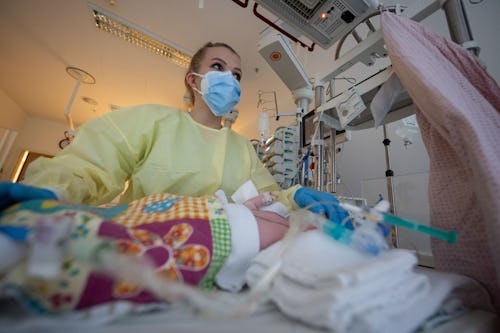
A vaccine given to mothers during pregnancy to protect babies from severe complications of RSV, a common respiratory virus and leading cause of infant hospitalizations in the United States, could be on the market soon. On Thursday, an advisory committee for the Food and Drug Administration (FDA) voted in support of recommending the approval of Pfizer’s maternal RSV vaccine. The expert panel of 14 advisers voted unanimously on the experimental vaccine’s effectiveness, but some (10-4) voiced concerns about its safety based on the available data.
If approved by the FDA, the Pfizer vaccine would be given to pregnant individuals late in pregnancy to trigger an immune response in infants from birth through their first six months of life against RSV. The virus can be especially dangerous for premature infants and babies younger than 6 months old, according to the Centers for Disease Control and Prevention (CDC).
Experts on the committee found the single-dose vaccine’s effectiveness promising. Trial data shows the vaccine, branded as Abrysvo, is 82% effective at protecting newborns from severe RSV infections during their first three months of life and is 69% effective at six months, according to a briefing document published by the FDA.
So while there was no debate about the vaccine’s effectiveness, some experts on the panel were concerned that the rate of preterm births among those who had taken the vaccine (5.7%) was slightly higher than those who got the placebo (4.7%). The FDA analysis of the data notes that while “a numerical imbalance” was observed, it does not appear to be “statistically significant.”

Dr. Paul Offit of the Children’s Hospital of Philadelphia, one of the four experts on the panel who voted “no” on whether the vaccine was safe, told the Associated Press he was concerned about the risk of preterm births. “If you’re in any sense risking premature births with this vaccine, I think there will be a big price to pay,” Offit said.
Dr. David Kim, director of the Division of Vaccines at the Office of Infectious Disease in the U.S. Department of Health and Human Services and a member of the advisory committee, voted “yes” on both the vaccine’s efficacy and safety. He told CNN he wasn’t convinced that the data showed the vaccine caused preterm births. “I guess when I put all the evidence together, I’m not convinced that there’s a clear causal relationship between this vaccine and preterm birth. I don’t think we can rule out chance. I don’t think we can rule out confounding by time or place,” Kim told the news outlet.
Another panelist, Dr. Arnold Monto, told CBS News, he wasn’t sure more testing would give a clearer answer. “I’m troubled, as everybody is, by the prematurity issue,” Monto said. “And I’m not sure running it through another, maybe season, is going to give us an answer.”
As for mothers who received the vaccine during the trial, the FDA’s briefing notes they experienced mild to moderate adverse reactions such as fatigue, muscle aches, headache, and pain at the injection site.
Pfizer estimates that 20,000 infant hospitalizations and 320,000 doctor visits in the United States could be prevented every year if enough pregnant individuals received the vaccination. The FDA is expected to make a decision on the vaccine’s approval by August.
0 comments:
Post a Comment